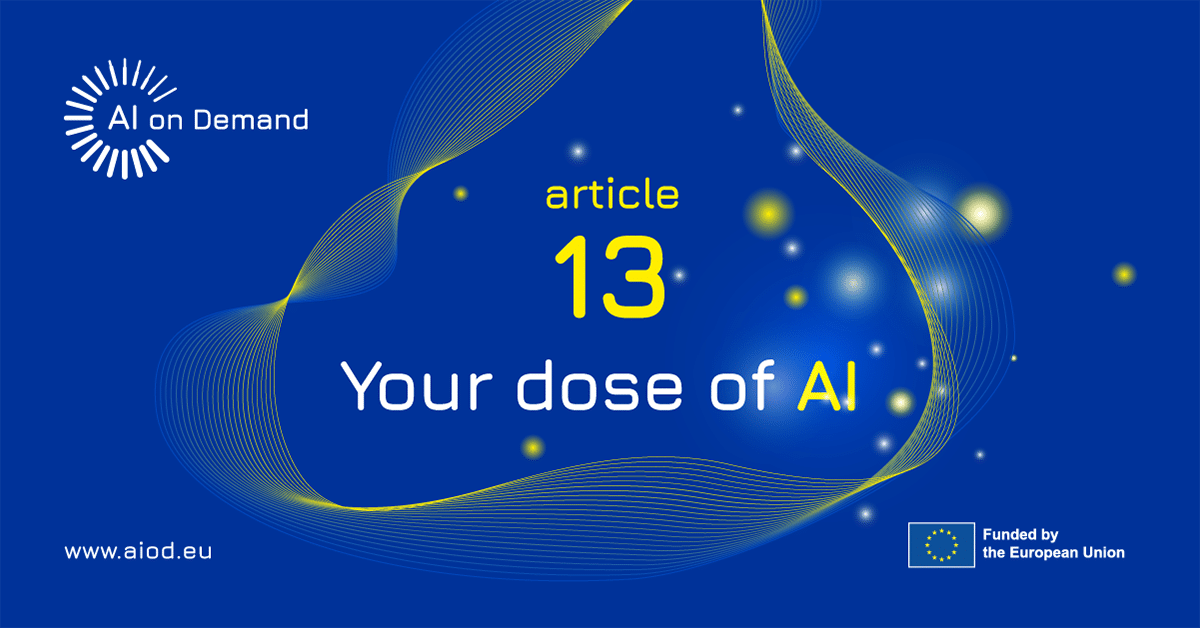Embracing AI as our collaborative future

Usually when we read about AI innovation we find opinions on opposite sides: either it’ll solve everything for us, painting a very utopian future, or it’ll make us all obsolete, by maybe replacing us in the workforce or even becoming a threat to our safety. But the real story emerging is much more nuanced. AI isn’t here to take over, it’s here to team up with us. This subtle shift has the potential to make things better and more efficient in pretty much every industry. Projects like AI4Europe are focused on making sure AI develops ethically and with people at the center, so we build and use it responsibly.
The concept of human augmentation supported by AI means making us more efficient or helping us brainstorm for ideas, not replacing us or our work. It’s about using AI as a tool to expand our own thinking or aid us with problem solving. Today, we can achieve more, dig deeper, and innovate faster than ever.
It isn’t just about automating repetitive tasks, which is certainly one of the advantages we have discovered as we integrate AI tools into our daily lives. But a partnership where each side has the potential to bring something. AI can crunch huge amounts of data and spot patterns fast, while we bring intuition, emotional intelligence, and a grasp of social complexities.
One great example of this can be found in the health sector. Think about medicine and how AI can analyze scans accurately, helping doctors spot diseases early and create personalized treatments that can improve the livelihood of many patients.
In education, AI tutors can adapt to how each student learns, offering targeted content and feedback to make learning an easier process. For creatives, AI can whip up initial ideas, help find out what audiences like, and let human artists and designers focus on the big creative picture and emotional impact.
Even in jobs that are physically demanding, exoskeletons or robot helpers can boost strength, reducing injuries and making things safer for workers. This collaborative approach means a future where we can work side-by-side, building a world that’s more efficient and ultimately, more focused on people.
But what do we actually need to create this type of partnership? Well, to effectively work with AI we need to remind ourselves of some principles. It all comes down to being responsible, clear about what’s the use we’re making of these tools, and being always willing to learn and adapt.
The first big step is building trust. We need to understand why AI makes certain decisions to work well with it. That’s where Explainable AI (XAI) comes in, making AI’s thought process easier to grasp. Sometimes AI systems can pick up on biases from the data they’re trained on and spread them if we’re not careful. We’ve seen this before with things like facial recognition systems being biased against certain groups. Therefore, by being aware of how AI tools work, we can also contribute to refining and prevent bias.
A good partnership means constantly checking for potential errors and making sure AI outcomes are fair for everyone. Laws like the EU’s AI Act even require human oversight for high-stakes AI, showing that accountability is a worldwide priority.
AI has definitely changed our jobs, we can see it today with the more repetitive and data-heavy tasks, our uniquely human abilities (like critical thinking, empathy, creativity, and tackling tricky problems) will become even more important. This means we’ll need solid training programs to help people develop these new skills for working alongside AI. Companies and schools need to encourage a mindset of life-long learning so everyone can adapt and thrive with AI.
The human-AI partnership is not just a technological advancement, it represents a fundamental rethinking of how we work, create, and solve problems in the digital age. By moving beyond the fear, or mistrust of these tools we can embrace AI as a powerful helper and leverage its capabilities to enhance our lives.
This collaboration promises a future of innovation, better informed decision-making, and the potential to tackle some of the world’s most complex challenges with efficacy. As initiatives like AI4Europe continue to champion responsible and human-centric AI development, we are well on our way to forging a truly useful relationship that benefits all of humanity.
If you’re interested in being part of the AI revolution you can start by exploring our AI-on-Demand Platform, the community-driven digital ecosystem developed by the European Union, through projects like AI4Europe and DeployAI. Our core mission is to empower European research, innovation, and adoption of AI, while upholding European values of quality, trustworthiness, and explainability.
Authors: Natalia Cardona (F6S)



